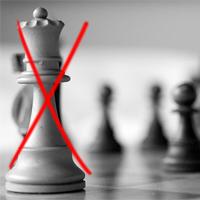
A Slight Advantage in the Queenless Middlegame
A slight advantage doesn't mean you're necessarily going to win the game. It just means that your opponent has the more difficult problems to solve, and his mistakes will probably hurt his position more than yours will. In a queenless middlegame, prosecuting such a small advantage requires that one presents one's opponent with difficult choices - especially with regards to transposing into various pure endings. As the game goes on, simplification happens naturally, and the defender needs to be able to determine which kind of simplifications lead to the safe haven of the draw, and which lead to further trouble.
A typical example is the following, my game against GM Gata Kamsky from 2010:
Our main game features world champion Viswanathan Anand, against GM Jon Ludvig Hammer. At the point the queenless middlegame began, the game was basically equal. However, Anand was slowly able to gain a slight advantage. As simplification carried the game forward to a minor piece ending, White's advantage remained slight - consisting of a better bishop and some space advantage on the queenside. But with the battle restricted to only one side of the board, White's chances of winning still did not seem high.

Finally, perhaps due to time pressure, Hammer misevaluated the exchange of a further pair of minor pieces - a seemingly surprising exchange of the white knight for the black bishop, leaving Black with apparently a total blockade, as well as vulnerable white pawns on the kingside should White "try anything". But Anand had seen that the black knight would end up fatally restricted. Unfortunately a double blunder (perhaps also due to the rapid pace of the game) marred the finish.
RELATED STUDY MATERIAL
- Read IM Bryan Smith's previous articles on the queenless middlegame: Part 1, Part 2, Part 3
- Watch GM Dejan Bojkov's video When to Trade Pieces 3: Advanced Simplification!
- Watch GM Roman Dzindzichashvili's video series Essentials of Minor Piece Endgames, Part 2 on bishop vs. knight;
- Practice your skills of winning a bishop ending two pawns up.






